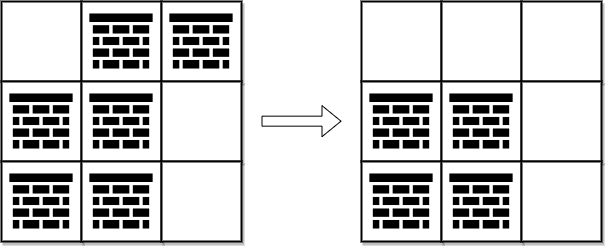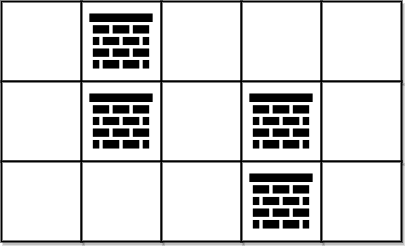Problem
You are given a 0-indexed 2D integer array grid of size m x n. Each cell has one of two values:
0represents an empty cell,1represents an obstacle that may be removed.
You can move up, down, left, or right from and to an empty cell.
Return **the *minimum* number of obstacles to remove so you can move from the upper left corner (0, 0) to the lower right corner **(m - 1, n - 1).
Example 1:

Input: grid = [[0,1,1],[1,1,0],[1,1,0]]
Output: 2
Explanation: We can remove the obstacles at (0, 1) and (0, 2) to create a path from (0, 0) to (2, 2).
It can be shown that we need to remove at least 2 obstacles, so we return 2.
Note that there may be other ways to remove 2 obstacles to create a path.
Example 2:

Input: grid = [[0,1,0,0,0],[0,1,0,1,0],[0,0,0,1,0]]
Output: 0
Explanation: We can move from (0, 0) to (2, 4) without removing any obstacles, so we return 0.
Constraints:
m == grid.lengthn == grid[i].length1 <= m, n <= 10^52 <= m * n <= 10^5grid[i][j]is either0or1.grid[0][0] == grid[m - 1][n - 1] == 0
Solution
class Solution {
public int minimumObstacles(int[][] grid) {
int n = grid.length;
int m = grid[0].length;
int[][] dirs = new int[][] {{0, 1}, {1, 0}, {0, -1}, {-1, 0}};
Queue<State> q = new PriorityQueue<>((a, b) -> a.removed - b.removed);
q.add(new State(0, 0, 0));
boolean[][] visited = new boolean[n][m];
visited[0][0] = true;
while (!q.isEmpty()) {
State state = q.poll();
if (state.r == n - 1 && state.c == m - 1) {
return state.removed;
}
for (int[] d : dirs) {
int nr = state.r + d[0];
int nc = state.c + d[1];
if (nr < 0 || nc < 0 || nr == n || nc == m || visited[nr][nc]) {
continue;
}
visited[nr][nc] = true;
State next = new State(nr, nc, state.removed);
if (grid[nr][nc] == 1) {
next.removed++;
}
q.add(next);
}
}
return -1;
}
private static class State {
int r;
int c;
int removed;
State(int r, int c, int removed) {
this.r = r;
this.c = c;
this.removed = removed;
}
}
}
Explain:
nope.
Complexity:
- Time complexity : O(n).
- Space complexity : O(n).